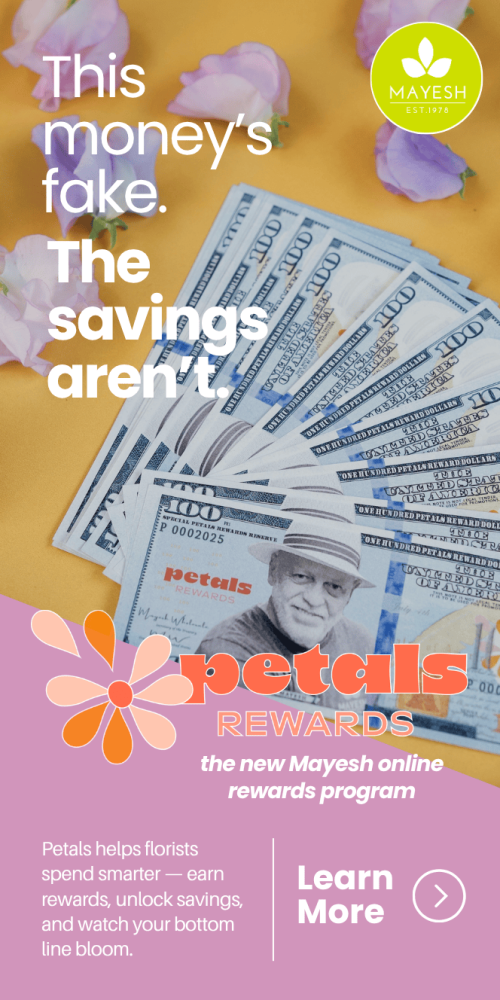We are happy to report that Bloomia’s CEO Werner Jansen, one of the nation’s sultans of tulips is getting recognized for his impactful work. Bloomia’s entire cut flower supply chain across all of Bloomia’s International growing operations – which encompasses farms in the US, Chile, and South Africa — will be certified by the Fair Food Program.
Full Article Below Source
Bloomia Gets Big Honor – Good Guys Do Win
By Jill Brooke

Always nice when a flower farmer we know makes a shift that helps the world even more.
We are happy to report that Bloomia’s CEO Werner Jansen, one of the nation’s sultans of tulips, a guy who brought innovative hydration techniques from his native Amsterdam to his new home in Virginia, is getting recognized for his impactful work.
Bloomia’s entire cut flower supply chain across all of Bloomia’s International growing operations – which encompasses farms in the US, Chile, and South Africa — will be certified by the Fair Food Program.
Not only that but the U.S. Department of Labor’s Bureau of International Affairs is also applauding these efforts. They have given a $2.5 million grant to the Fair Food Standards Council to expand protections that will go to Werner’s farms as well as other worthy farms.
What great news. I first met Werner Jansen at the Certified American Grown event in Washington D.C. since he is also an advocate of having locally grown flowers at certain federal events like Memorial Day and July 4th. He is someone who is a thoughtful listener, an innovator and cares about the growth of flowers and ideas that help mankind.
Here are the deets of the program and why it’s important.
What is the Fair Food Program: The Fair Food Program (FFP) is a partnership among growers, workers, and retailers that are transforming agriculture in America through the power of prevention. The Fair Food Program was created by the Coalition of Immokalee Workers (CIW), a human rights organization founded by farmworkers in southwest Florida. Buyers agree to purchase covered produce only from farms that meet the standards required by the Fair Food Code of Conduct, as verified by the Fair Food Standards Council (FFSC).
They also pay their suppliers a small Fair Food Premium This money is then passed on to farmworkers in their regular paychecks in the form of a bonus.
Participating growers agree to implement the Fair Food Code of Conduct on their farms, to cooperate with monitoring by the FFSC, and to pass along the Fair Food Premium. Farms that fail to comply are suspended from the Program, and can no longer sell their products to Participating Buyers until they meet the FFP’s standards. Current buyers include Walmart, Whole Foods, McDonald’s, Taco Bell, and Aramark, among others.
Why this matters: The FFP’s expansion to cover all of Bloomia’s international flower supply chain is a watershed moment in the flower industry, and in the world of business and human rights writ large. Implementing and enforcing human rights protections across all farms in a global supply chain is a giant leap forward in ensuring that workers in an increasingly globalized industry have guarantees of workplace safety and dignity, with meaningful consequences for farms where human rights violations are found. The pilot programs that will begin soon will serve as a marker for the entire flower industry.
“If a company as large and successful as Blooomia can partner with a worker-driven social responsibility program like the Fair Food Program, there is no reason why the rest of the industry shouldn’t be able to meet that same gold standard for human rights protections in their supply chains as well,” says Werner Jansen.

All it takes is one person in power to change the status quo and make it fairer.
This reminds me of a similar story that just took place. Yale Law School Dean Heather Gerken was the first to say no to the unfair practices of the U.S. News and World Report’s flawed ranking system for colleges – which caused a ripple effect in other colleges demanding a fairer ranking system,
Jansen is taking the lead to show one can still be profitable and do good. He is also hoping that others will follow his lead.
“To Bloomia’s immense credit, they have seized the leadership position on human rights in the cut flower sector by partnering with the FFP as the pioneers in worker-driven social responsibility in this important and growing industry, and we are proud to be their partners on this journey,” noted Lucas Benitez of the Coalition of Immokalee Workers, which pioneered the FFP.
“We have seen how, in a few short years, the Fair Food Program’s market-based model – by creating partnerships between food retailers, growers and workers – has effectively rooted out long-entrenched abuses in U.S. agriculture, rewarded ethical growers and provided risk prevention in our food supply chains,” said Judge Laura Safer Espinoza, Executive Director of the Fair Food Standards Council. “The opportunity provided by ILAB’s support for a pilot program in Fair Food Program expansion, starting with the flower industry, is tremendously exciting, particularly with partners like Bloomia, Whole Foods Market and Compass Group,” she added.
Again this is another example of Margaret Mead’s inspiring quote. As she wisely said, “Never doubt that a small group of thoughtful, committed citizens can change the world; indeed, it’s the only thing that ever has.”

Jill Brooke is a former CNN correspondent, Post columnist and editor-in-chief of Avenue and Travel Savvy magazine. She is an author and the editorial director of FPD, floral editor for Aspire Design and Home magazine and contributor to Florists Review magazine.























